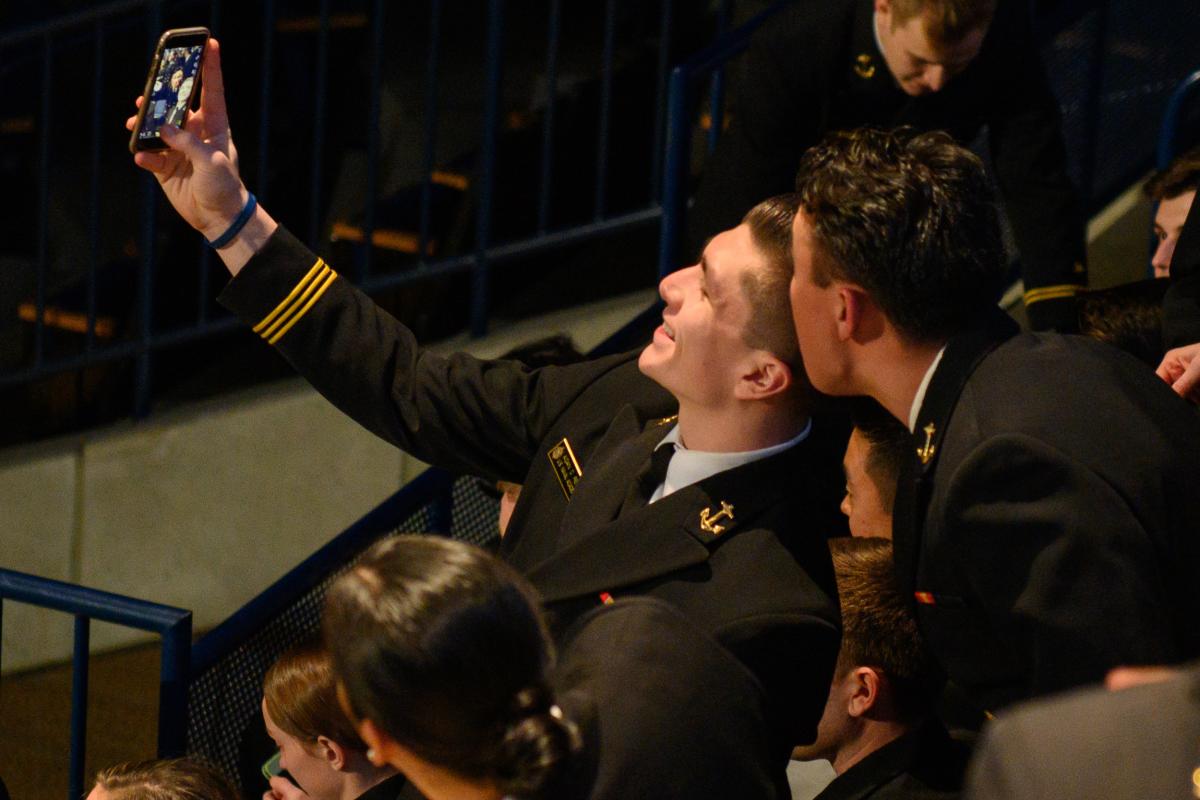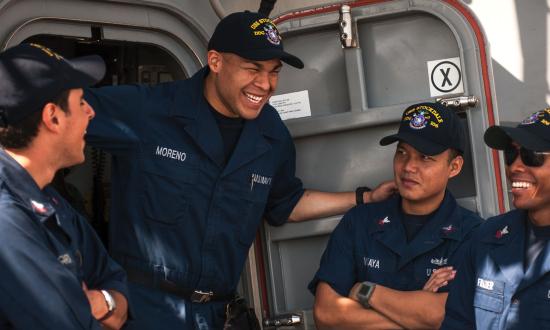Naval officers are supposed to be fiercely apolitical because our country’s civilian leaders rely on the military to provide advice and take action that is free of partisanship. However, the advent of social media has introduced a new pressure on the apolitical nature of the military. At the Naval Academy, for example, the challenges of navigating social media as midshipmen has introduced a dynamic that could strain the military’s reputation as being above politics.
Members of the military now live in a world in which the politicians they support, their opinions on political topics, and their digital footprints are visible to their subordinates and the general public. In light of this, midshipmen must be aware that their actions on social media will gain them a reputation that could affect how their future sailors and Marines view them. Balancing the competing demands of a midshipman’s responsibilities with the desire for a social media presence is a relatively new challenge. Of course, a social media account is personal. However, most midshipmen clearly state their affiliation with the Naval Academy or imply their affiliation by posting photographs in uniform on their personal social media accounts. Many midshipmen still use their accounts as platforms to express personal political views, blurring the line between their personal views and their professional responsibilities as future officers.
As an example, Midshipman First Class Chase Standage was expelled from the Naval Academy in 2021 after making approximately 40 tweets that were politically extreme and racially insensitive in nature. While Standage’s views do not reflect those of the other midshipmen attending the Naval Academy, it was significant that a midshipman believed he could opine publicly on his political and social beliefs, including views of an extreme nature. Standage was expelled because his remarks were extreme and insensitive, yet his case demonstrates a trend of increasing willingness among midshipmen to give their opinions on political matters, share information that is political in nature, and communicate their personal beliefs. This dynamic has increased during the COVID-19 pandemic and the highly charged political environment of the past couple of years.
It should be noted that the majority of midshipmen social media activism is not in direct violation of any Department of Defense (DoD) guideline or regulation. Indeed, according to the DoD’s directive on social media, members of the military can express political opinions as long as they clearly state that they are not reflective of the U.S. government or DoD. We do not take issue with or advocate for the modification of these regulations. We do, however, believe that midshipmen should make the choice to conduct themselves on social media in a way that is aligned with the ideals of the profession they are seeking to join. The higher standard of personally embodying the apolitical nature of the U.S. military should guide midshipmen as they navigate the life of a midshipman on social media, not merely meeting the minimum requirements of a social media directive. Without this personal willingness and desire to measure up to the values of the naval profession, the long-standing understanding among naval officers that certain responsibilities accompany their uniform may be lost in the media-saturated 21st century.
Midshipmen today should stay above the political fray by looking to the crowning examples of military officers whose apolitical reputations left a positive impact on the country. One example is General George Marshall, whose impact as Army Chief of Staff was clear on the outcome of the World War II. In spite of the personal trust and respect he enjoyed from President Franklin D. Roosevelt, Marshall guarded a degree of distance between himself and the President to maintain his status as impartial in American politics. As Thomas E. Ricks writes, “Marshall would insist on remaining socially and emotionally distant from the President, seeing it as necessary to maintain a professional relationship.” He would even go so far as to insist that Roosevelt refer to him as “General Marshall” rather than the more informal “George” that was in keeping with the President’s informal style.1
The reputation Marshall built had a notable impact on American strategy during World War II. Marshall’s straight-shooting and politically impartial style developed bonds of trust between Roosevelt and his Army Chief of Staff. As Roosevelt would later say to General Marshall, “I feel I could not sleep at night with you out of the country.”2 This reputation, however, also had an impact outside the White House; it won Marshall the respect and trust of Congress. Later, while serving as Secretary of Defense, Marshall was instrumental in the foreign aid plan to rebuild Europe, known as the Marshall Plan. After the allied victory in World War II, it was not inevitable that the American people would tolerate such robust investment outside the country. The tendency to focus inward after a victorious conclusion to WWII could have stymied the implementation of the Marshall Plan. This would have had potentially disastrous consequences, as the Marshall Plan would prove to be a singular achievement in U.S. foreign policy. As historian David L. Roll writes, “Marshall’s words, backed by his reputation as an apolitical straight shooter, convinced Congress to allocate the bulk of its military and economic assistance to Europe.”3
On the other hand, the loss of trust that results from a military that is perceived to be political has negative implications on its effectiveness and public support. The presence of active duty and former military members among the mob that stormed the U.S. Capitol building on 06 January 2021 called the apolitical nature of the military into question for many Americans. A recent Gallup Poll shows a subtle decline in the confidence of the American people in the U.S. military, which substantiates the concern that the perception of a military influenced by partisanship has detrimental effects on the trust that is needed between the military and its civilian superiors. Moreover, the presence of the Chairman of the Joint Chiefs of Staff at a presidential photo opportunity in Lafayette Square in 2020 further called the apolitical nature of the military into question. Later, General Milley would acknowledge his role in the photo opportunity as a mistake. He said in a speech to the National Defense University,
My presence in that moment and in that environment created a perception of the military involved in domestic politics. As a commissioned uniformed officer, it was a mistake that I have learned from, and I sincerely hope we all can learn from it. We who wear the cloth of our nation come from the people of our nation, and we must hold dear the principle of an apolitical military that is so deeply rooted in the very essence of our Republic.
Midshipmen should not abstain from thinking politically. As Clausewitz famously said, “war is politics by other means.”4 But the politics that midshipmen are involved in should be of a higher calling. As future officers, midshipmen swear an oath to protect a political system that undergirds this system of politics. Their loyalties must be first to the Constitution of the United States before a loyalty to any particular political party. As General Milley advised in the same 2020 speech, “Embrace the Constitution; keep it close to your heart. It is our North Star; it's our map to a better future. Though we are not a perfect union, believe in the United States.” The oath “to protect and defend the Constitution of the United States” should inspire all midshipmen—and all service members more broadly—to live up to the high ideal of an apolitical military. Midshipmen can start by recognizing that after they wear a military uniform—and the way they conduct themselves is interconnected with their service to the country. At a time when the apolitical nature of the military has been called into question by technological changes and recent events, maintaining an apolitical presence on social media is one way to measure up to the best traditions of the naval service.
- Thomas E. Ricks, The Generals: American Military Command from World War II to Today (New York: Penguin, 2012).
- Andrew Roberts, Leadership in War: Lessons from Those Who Made History (London: Penguin UK, 2019).
- David L. Roll, George Marshall: Defender of the Republic (New York: Dutton Caliber, 2020).
- Carl Clausewitz, On War. Vol. 20, (London: Penguin UK, 1982).






